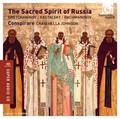Vladimir Martynov 1946-

Vladimir Martynov (born on 20 February, 1946 in Moscow) is Russian composer known for his music in the concerto, orchestral, chamber, and choral genres.
Vladimir Martynov is a leader of the generation of composers of the Soviet Union, born after World War II, who pursued avant-garde courses at a time when official disfavor of such styles brought severe penalties to career development, but did not carry the physical risks of earlier years in the USSR. He studied piano as a child and gained an interest in composition. Enrolling in the Moscow Conservatory, he studied piano under Mikhail Mezhlumov and composition under Nikolai Sidelnikov, graduating in 1971.
In his early works, Martynov used serial music (twelve-tone) technique. In 1973 he obtained a position at the studio for electronic music of the Alexander Scriabin Museum, a Soviet-era instituion comparable in significance to the RAI Electronic Music Studio in Milan, the West German Radio studio, and the ORTF Studio in Paris, which provided a meeting ground for the avant-garde musicians, among them, Sofia Gubaidulina, Sergei Nemtin, Alfred Schnittke, and Edison Denisov. At the Scriabin Studio, Martynov helped to form a rock group called Boomerang, for whom he wrote a rock opera Seraphic Visions on texts of St. Francis of Assisi (1978).
Vladimir Martynov is also known as an ethnomusicologist, specializing the music of the Caucasian peoples, Tajikistan, and other ethnic groups in Russia. His studies of medieval Russian and European music, as well as religious musical history and musicology, also led him to study theology, religious philosophy and history. In the late 1970s, Martynov began studying early Russian religious chant, as well as Western Renaissance music. His interested in minimalism was fuelled by the timeless quality of chants and Renaissance polyphony. At about this time, he began teaching at the Russian Orthodox Theological Academy of the Holy Trinity-St. Sergius Monastery in Sergiyev Posad, near Moscow. In the early 1980s he wrote music specifically tailored for use in church services, afterwards resuming writing original compositions in his particular minimalist style.
Since the fall of the Soviet Union, he has written works that take on large Christian themes, such as Apocalypse (1991), Lamentations of Jeremiah (1992), Magnificat (1993), Stabat Mater (1994), and Requiem (1998). One of his major compositions is a nearly hour-long piece called Opus Posthumum (1993), devoted to the idea that “a man touches the truth twice. The first time is the first cry from a new born baby’s lips and the last is the death rattle. Everything between is untruth to a greater or lesser extent.”
Martynov’s recordings have appeared on Le Chant du Monde’s imprint “Les Saisons Russes” and on the Moscow-based independent label LongArms Records. In 2009 London Philharmonic gave the world premiere of his opera Vita Nuova; the US premiere of the work was at the new Alice Tully Hall on February 28, 2009.
Martynov has authored several books and seminal articles on musical theory, history and philosophy of music.
(Adapted from <http://en.wikipedia.org/wiki/Vladimir_Martynov> Accessed 30 December 2012)
Vladimir Martynov is a leader of the generation of composers of the Soviet Union, born after World War II, who pursued avant-garde courses at a time when official disfavor of such styles brought severe penalties to career development, but did not carry the physical risks of earlier years in the USSR. He studied piano as a child and gained an interest in composition. Enrolling in the Moscow Conservatory, he studied piano under Mikhail Mezhlumov and composition under Nikolai Sidelnikov, graduating in 1971.
In his early works, Martynov used serial music (twelve-tone) technique. In 1973 he obtained a position at the studio for electronic music of the Alexander Scriabin Museum, a Soviet-era instituion comparable in significance to the RAI Electronic Music Studio in Milan, the West German Radio studio, and the ORTF Studio in Paris, which provided a meeting ground for the avant-garde musicians, among them, Sofia Gubaidulina, Sergei Nemtin, Alfred Schnittke, and Edison Denisov. At the Scriabin Studio, Martynov helped to form a rock group called Boomerang, for whom he wrote a rock opera Seraphic Visions on texts of St. Francis of Assisi (1978).
Vladimir Martynov is also known as an ethnomusicologist, specializing the music of the Caucasian peoples, Tajikistan, and other ethnic groups in Russia. His studies of medieval Russian and European music, as well as religious musical history and musicology, also led him to study theology, religious philosophy and history. In the late 1970s, Martynov began studying early Russian religious chant, as well as Western Renaissance music. His interested in minimalism was fuelled by the timeless quality of chants and Renaissance polyphony. At about this time, he began teaching at the Russian Orthodox Theological Academy of the Holy Trinity-St. Sergius Monastery in Sergiyev Posad, near Moscow. In the early 1980s he wrote music specifically tailored for use in church services, afterwards resuming writing original compositions in his particular minimalist style.
Since the fall of the Soviet Union, he has written works that take on large Christian themes, such as Apocalypse (1991), Lamentations of Jeremiah (1992), Magnificat (1993), Stabat Mater (1994), and Requiem (1998). One of his major compositions is a nearly hour-long piece called Opus Posthumum (1993), devoted to the idea that “a man touches the truth twice. The first time is the first cry from a new born baby’s lips and the last is the death rattle. Everything between is untruth to a greater or lesser extent.”
Martynov’s recordings have appeared on Le Chant du Monde’s imprint “Les Saisons Russes” and on the Moscow-based independent label LongArms Records. In 2009 London Philharmonic gave the world premiere of his opera Vita Nuova; the US premiere of the work was at the new Alice Tully Hall on February 28, 2009.
Martynov has authored several books and seminal articles on musical theory, history and philosophy of music.
(Adapted from <http://en.wikipedia.org/wiki/Vladimir_Martynov> Accessed 30 December 2012)





